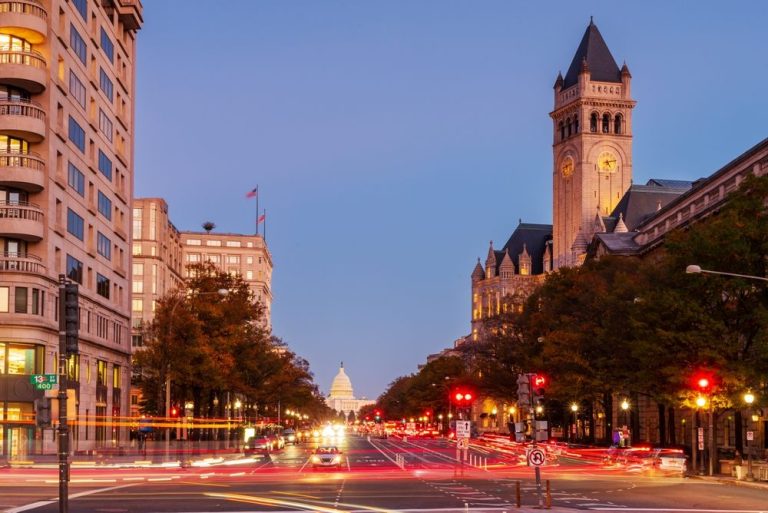In Washington, D.C., this month, the discussion is around another government shutdown averted, SEC developments, the FTC, and more. In this month’s ICR D.C. Insider, we share our insights and analysis about developments in Washington that could have an immediate and long-term impact on your business.
What’s Next In Washington
- Government Shutdown Averted – Next Up: Aid For Israel, Ukraine, Taiwan & U.S. Border
Now that the Federal Government is funded into 2024 – the Agriculture, Transportation, Housing and Urban Development and Veterans Affairs departments through January 19th and the Defense Department and remaining parts of the government through February 2nd – the House, Senate and White House are at odds on a $100-plus billion supplemental funding request for Israel, Ukraine, Taiwan and the U.S.-Mexico border. This negotiation, as well as work on other end-of-2023 must-pass legislation are further complicated by the 2024 elections, especially given that the first presidential contest begins on January 15th with the Iowa Caucuses.
SEC
- Supreme Court Appears to Favor Restrictions on SEC In-House Tribunals – The U.S. Supreme Court appears likely to strip the Securities and Exchange Commission (SEC) of its ability to use its own courts to seek fines from those accused of violating securities laws and regulations in a case that could threaten similar Executive Branch procedures that Congress authorized for consumer protection, workplace safety, among other areas. During oral arguments, the Court’s conservative justices were broadly sympathetic to arguments from a hedge fund founder accused of fraud, who said that the SEC’s practice of asking its in-house judges to impose monetary penalties on defendants violates the Constitution’s Seventh Amendment right to a jury trial.
- Climate Change Disclosure Rule – There were a series of developments as the ultimate breadth of the SEC’s climate change rule continues to take shape:
- Reuters reports that SEC officials told lobbyists and corporate executives that Scope 3 emissions – which are greenhouse gases from a company’s supply chain and the consumption of its products by customers – may be dropped from the final text.
- Republican SEC Commissioner Mark Uyeda said the Commission should seriously consider scrapping its climate disclosure rule and starting over with a new proposal.
- Stock Repurchase Rule on Hold – Following its November ruling that sent a rule that required companies to provide more information about stock repurchases back to the SEC to fix defects, the Commission was unable to make the changes in the time allotted to it by the court. The court – which is expected to vacate the rule – found that the rule’s adoption was arbitrary and capricious and that the Commission failed to conduct a proper analysis of the costs and benefits.
- A Focus on Nondisclosure Agreements – The Commission is working to ensure nondisclosure language is not being used to deter whistleblowers, who are a key source for the SEC – which can (following a tip from a whistleblower) monitor a company’s events in real-time and police the market.
- SEC, FASB Take Closer Look at Companies’ Statement of Cash Flows – U.S. regulators and standard setters are taking a closer look at cash-flow statements, with a focus on how companies determine whether errors made in the overlooked financial statement are material to investors, how such corporate disclosures may lag behind other financial statements in terms of usefulness for investors as well as the quality of the information that companies provide.
PCAOB
- Major Enforcement Actions – In a series of historic settlements, the Public Company Accounting Oversight Board (PCAOB) imposed $7.9 million in total fines in sanctions of three China-based accounting firms and four individuals for violations of S. securities laws and PCAOB rules and standards. These are the first enforcement settlements with Chinese and Hong Kong firms since the PCAOB secured historic access to inspect and investigate firms headquartered in China and Hong Kong in 2022.
FTC
- Franchise Rule Proposal Pushback – A bipartisan coalition of 15 senators came to the defense of the franchising industry as the sector awaits new regulations from the Federal Trade Commission (FTC). In a letter to FTC Chair Lina Khan, the lawmakers urged Khan to ensure that any new rules “benefit the franchise business model and support our constituents who utilize the franchise business model to open and grow their businesses.” The FTC concluded its public comment period over the summer, telling CNBC that it drew more than 5,500 comments.
- FTC Warns Influencers About Inadequate Disclosures on Social Media – A dozen social media influencers and two trade associations received warnings about the lack of adequate disclosures in their Instagram and TikTok posts. As a practical matter, in promotional TikToks or Instagram Reels, the disclosure should be made audible in the video itself as well as visible in the text description. The rule applies to paid sponsorships and promotions in exchange for free products, and in cases of any business or family relationships.
- Added Tools For Investigations of AI-Related Claims – By a 3-0 vote, the FTC approved a resolution authorizing it to use tools in nonpublic investigations involving products and services that use or claim to be produced using artificial intelligence (AI), or claim to detect its use. The result will streamline the FTC’s ability to issue Civil Investigative Demands (CIDs), which are a form of compulsory process similar to a subpoena.
Labor & NLRB
- New Joint Employer Rule Targeted – Following the National Labor Relations Board’s (NLRB) October vote to revamp the joint employer rule, an array of trade associations initiated a multi-front effort to stop it. More than 60 business trade associations representing a broad range of industries signed a letter to Congress that urged lawmakers to support a Congressional Review Act (CRA) resolution introduced by Bill Cassidy (R-La.) and Joe Manchin (D-W.Va.) and Reps. Virginia Foxx (R-N.C.) and John James (R-Mich.). Another coalition of trade groups, sued the NLRB and its four principals, alleging that the new rule “is as destabilizing as it is unlawful.”
- In late November, the NLRB announced that it delayed the effective date of the new joint employer regulations from December 26, 2023 to February 26, 2024. The Board said the extension was needed to facilitate resolution of legal challenges.
Additional Key Developments
- China – Key developments include:
- Chairman Mike Gallagher (R-Wisc.) of the House Select Committee on the Chinese Communist Party, and Sen. Dan Sullivan (R-Ark.), along with 41 of their colleagues, wrote to leadership of the House and Senate Armed Services Committees to recommend strong restrictions on certain U.S. investments to China and other adversarial nations.
- House Foreign Affairs Committee Chairman Michael McCaul (R-Texas) and Ranking Member Gregory W. Meeks (D-N.Y.) introduced the bipartisan “Preventing Adversaries from Developing Critical Capabilities Act” that builds on the Biden Administration’s “Addressing United States Investments in Certain National Security Technologies and Products in Countries of Concern” Executive Order.
- Gallagher and Raja Krishnamoorthi (D-Ill.), Ranking Member of the House Select Committee – along with Sen. Marco Rubio (R-Fla.) and 15 members of Congress – sent a letter to Commerce Secretary, Gina Raimondo, calling on the Department to address Chinese access to an open-source semiconductor research and design platform known as RISC-V (risk five).
- Bill Cassidy, M.D. (R-La.) and Lindsey Graham (R-S.C.) led the introduction of the Foreign Pollution Act. The proposal would implement a tariff on energy and industrial imports that have a higher environmental impact than those produced within the United States. The bill also aims to facilitate discussions for new global alliances to promote green trade with allies while cutting off China.
- Private equity and venture capital funds could face more regulations on their investments into China, as a result of a new bill introduced by Bob Casey (D-Pa.) and Rick Scott (R-Fla.). The legislation would require private investment funds to annually disclose any assets invested in China and other countries of concern to the SEC, including entity names, values, and use of proceeds. The SEC then would publicly release a report on those firms, including percentages of assets invested in China.
- The Biden Administration is looking to the advanced packaging process for semiconductors as another front in the race to decrease reliance on China and build out U.S. supply chains. The Commerce Department’s paper on advanced packing says the program is meant, “to enable semiconductors that are made in the U.S. to be packaged in the U.S. This end state is necessary to sustain U.S. global competitiveness and to maintain supply chain security and resilience.”
- In its annual report to Congress, the U.S.-China Economic and Security Review Commission said that despite renewed diplomatic engagement, tensions between the U.S. and China have escalated – and recommended that Congress consider consolidating programs from the Commerce and Defense Departments into a single export licensing system to enhance export control enforcement.



